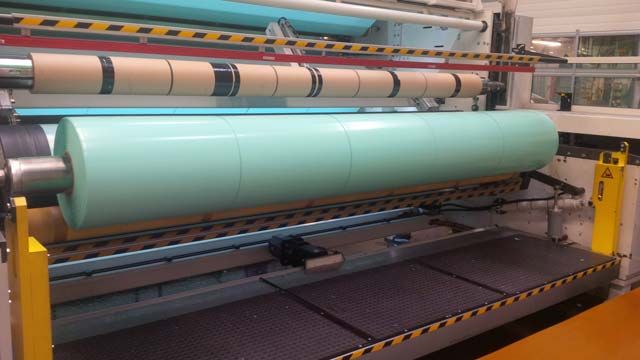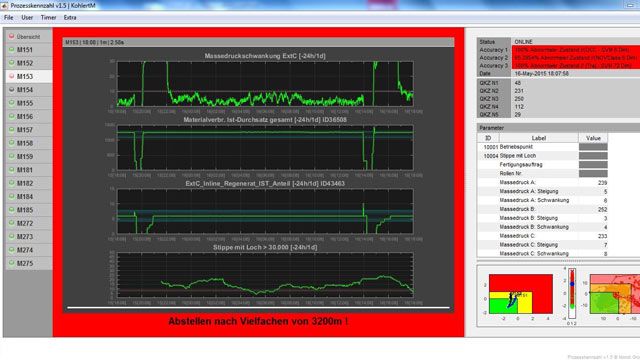Mondi Implements Statistics-Based Health Monitoring and Predictive Maintenance for Manufacturing Processes with Machine Learning
Challenge
Reduce waste and machine downtime in plastics manufacturing plants
Solution
Use MATLAB to develop and deploy monitoring and predictive maintenance software that uses machine learning algorithms to predict machine failures
Results
- More than 50,000 euros saved per year
- Prototype completed in six months
- Production software run 24/7
“bat365 Consulting’s support is among the best I’ve seen; the consultants are fast and exceptionally knowledgeable. We’ve already seen a positive return on investment from cost savings, and now we have more budget and time to complete more machine learning projects that will provide similar benefits.”
Mondi Gronau is a leading international manufacturer of packaging and paper products. The company’s plastic production plant delivers about 18 million tons of plastic and thin film products annually. The plant’s 900 workers operate approximately 60 plastic extrusion, printing, gluing, and winding machines 24 hours a day, 365 days a year.
Machine failures that result in downtime and wasted raw materials cost Mondi millions of euros each month. To minimize these costs and maximize plant efficiency, Mondi developed a health monitoring and predictive maintenance application. The application uses advanced statistics and machine learning algorithms to identify potential issues with the machines, enabling workers to take corrective action and prevent serious problems.
Mondi developed the application in MATLAB® with support from bat365 Consulting and Prof. Dr.-Ing. Andreas König, holder of the Chair for Integrated Sensor Systems (Department of Electrical Engineering and Computer Engineering at the Technical University of Kaiserslautern).
“As a manufacturing company we don’t have data scientists with machine learning expertise, but bat365 provided the tools and technical knowhow that enabled us to develop a production preventative maintenance system in a matter of months,” says Dr. Michael Kohlert, head of information management and process automation at Mondi.

One of Mondi Gronau’s plastic production machines, which deliver about 18 million tons of plastic and thin film products annually.
Challenge
The extrusion and other machines at Mondi’s plant are large and complex, measuring up to 50 meters long and 15 meters high. Each machine is controlled by up to five programmable logic controllers (PLCs), which log temperature, pressure, velocity, and other performance parameters from the machine’s sensors. Each machine records 300–400 parameter values every minute, generating 7 gigabytes of data daily.
Mondi faced several challenges in using this data for predictive maintenance. First, the plant personnel had limited experience with statistical analysis and machine learning. They needed to evaluate a variety of machine learning approaches to identify which produced the most accurate results for their data. They also needed to develop an application that presented the results clearly and immediately to machine operators. Lastly, they needed to package this application for continuous use in a production environment.
Solution
Mondi worked with bat365 Consulting and Prof. Dr.-Ing. Andreas König to develop and deploy health monitoring and predictive maintenance software in MATLAB.
The Mondi team had previously set up an Oracle® database to collect data from all the machines in the plant via an Ethernet network. They used Database Toolbox™ to access this database from within MATLAB.
Next, the team developed MATLAB scripts to clean the data by removing outliers and invalid values.
They developed an application in MATLAB to query the database and present the results graphically. For example, an operator can use the application interface to plot the pressure measured by a particular sensor over a period of minutes, hours, or weeks.
To enhance the application, they added statistical process control (SPC) capabilities that alert operators to sensor values that are outside normal operating ranges.
Using Statistics and Machine Learning Toolbox™ and Deep Learning Toolbox™, Mondi and bat365 consultants evaluated several machine learning techniques, including neural networks, k-nearest neighbors, bagged decision trees, and support vector machines (SVMs).
For each technique, they trained a classification model using logged machine data and then tested the model’s ability to predict machine problems. The tests showed that an ensemble of bagged decision trees was the most accurate model for their data.
The team further enhanced the MATLAB application by updating the interface to incorporate predictions from the machine learning model. These predictions enable equipment operators to receive warnings about potential failures before they occur. Mondi then used MATLAB Compiler™ to create a standalone executable version of the application, which is now used in production at the plant.

A MATLAB based HMI that enables equipment operators to receive warnings about potential failures before they occur.
Results
- More than 50,000 euros saved per year. “Our financial control department determined that we are saving more than 50,000 euros per year by using MATLAB for predictive maintenance,” says Dr. Kohlert. “That total is based on just eight machines. We expect that to increase at least fourfold as we analyze the data from more of our machines.”
- Prototype completed in six months. “With many consultants, there’s a great deal of discussion but no action,” notes Dr. Kohlert. “bat365 consultants started directly. We had the first tests within two months and a working prototype in six. The MATLAB code is easy to understand, so we can make changes rapidly when needed.”
- Production software run 24/7. “There’s a misconception that MATLAB is only for research or development,” says Dr. Kohlert. “We operate our machines nonstop, even on Christmas, and we rely on our MATLAB based monitoring and predictive maintenance software to run continuously and reliably in production.”